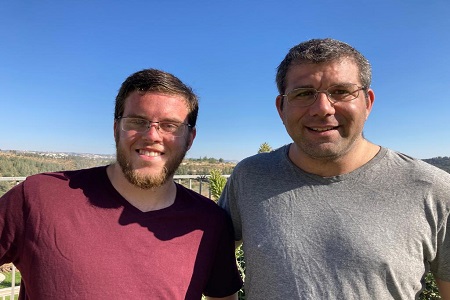
Hadassah Hospital Ein Kerem physician Marc Gotkine was enjoying an evening meal with his family in the backyard of their country home 45 minutes south of Jerusalem. A message pinged on his son Asaf’s phone, alerting Asaf that his 15-year-old neighbor, Jonathan, was having a severe asthma attack.
Asaf, a volunteer with the Magen David Adom ambulance rescue service, raced to the scene. Jonathan’s skin was blue, his lips were black and he had no pulse. Asaf began resuscitating him and told a bystander to call Hadassah physician Baruch Batzofin, chief resident in the Department of Anesthesiology and Critical Care, who also lived in the neighborhood. When Dr. Batzofin arrived, the two worked together to try to stabilize the boy’s condition. The boy’s pulse returned.
“When I could hear cries from the other side of our moshav, I realized it was pretty serious,” says Dr. Gotkine, who heads Hadassah’s ALS and Motor Neuron Disease Clinic. “I got there about a minute after Dr. Batzofin. I think it was because of Asaf’s initial efforts that Jonathan’s pulse came back.”
Nine minutes later, the paramedics arrived. “By then, Jonathan was intubated,” Dr. Gotkine recalls. “But then he lost his pulse again, so Asaf began chest compressions once more.”
The ambulance team transported Jonathan to Hadassah Ein Kerem’s Pediatric Intensive Care Unit, where surgeons performed a procedure to stop the spasms in his lungs.
Jonathan has made a full recovery. Asaf relates, “Jonathan came to synagogue on Shabbat to say birkat hagomel,” the prayer of thanks for recovery from a life-threatening situation. “This is the most serious case I’ve attended where the patient was completely fine afterward,” Asaf says. “It was very emotional for me, and I felt a mix of thankfulness and pride in having helped.”
It was also the first time that Jonathan, who has had asthma since he was a child, had a life-threatening attack.
Asaf is hoping to follow in his father’s footsteps by becoming a doctor, too. He is preparing for the entrance exams to study medicine in the Tzameret program, run by the Israel Defense Forces and the Hadassah Medical Organization.
“Growing up with a doctor in the house, I was exposed to the world of medicine,” he says. “I see what it means when neighbors come to ask medical questions, and I watch my father on phone calls as he gives advice to junior doctors.”
The value of saving life runs deep in Asaf’s family. One of his sisters is also an ambulance volunteer, and another is about to join the service. Asaf believes it’s crucial for the average person to learn basic life-saving techniques. “While we always hope we’re not going to have to use the knowledge, we never know when we may need it. Having that knowledge can mean the difference between life and death, maybe for your neighbor.”
